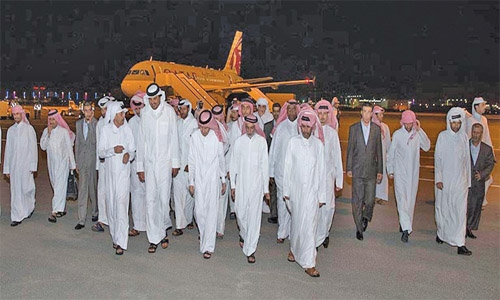Qatar paid $360m to terrorists to free hostages, says The Post
Dubai : Qatar has made payments to terrorists totalling at least $275 million to free nine members of the royal family and 16 other Qatari nationals kidnapped during a hunting trip in southern Iraq, a report by The Washington Post said.
The Post quoting, intercepted communications, said the payment plan allocated an additional $150 million in cash for individuals and groups acting as intermediaries, although they have long been regarded by U.S. officials as sponsors of international terrorism.
These include Iran’s Islamic Revolutionary Guard Corps and Kata’ib Hezbollah, an Iraqi paramilitary group linked to numerous lethal attacks on American troops during the Iraq War, the Post said.
Larger deal
The payments were part of a larger deal that would involve the Iranian, Iraqi and Turkish governments as well as Lebanon’s Hezbollah militia and at least two Syrian opposition groups, including al-Nusra Front, the notorious Sunni rebel faction linked to al-Qaeda.
The report contradicts statement made by Qatar earlier denying reports that it paid terrorist organizations as part of the deal. The country, however, acknowledge receiving help from multiple countries in securing the hostages’ release last year.
Weeks ago, an elaborate investigative piece published by The New York Times has revealed the intriguing tale of how, in late November 2015, a group of Qatari falcon hunters – including members of Qatar’s ruling al-Thani family – defied warning to go on a hunting trip to Iraq’s Muthanna Province.
The investigation, by Robert F. Worth, is centered around a sum of $360 million, meant to be ransom money, gets caught at the Baghdad airport, and the circumstances that lead to this turn of events.
Their capture – by a group named Kata’ib Hezbollah – triggered panic in Doha. What started was a desperate scramble for clues and connections that transcends borders to reach Qassem Suleimani, Hezbollah factions and senior ministers in the Iraq government, and also many terrorist groups.
In a letter issued last month, Qatar’s ambassador to the United States asserted flatly that “Qatar did not pay a ransom.”
“The idea that Qatar would undertake activities that support terrorism is false,” the ambassador, Sheikh Meshal bin Hamad al-Thani, wrote.
But the conversations and text messages obtained by The Post paint a more complex portrait.
As high as $1 billion
The post, citing several communiques, said senior Qatari diplomats signed off a series of side payments ranging from $5 to $50 million to Iranian and Iraqi officials and paramilitary leaders, with $25 million earmarked for a Kata’ib Hezbollah boss and $50 million set aside for “Qassem,” an apparent reference to Qassem Soleimani, the leader of Iran’s Islamic Revolutionary Guard Corps and a key participant in the hostage deal.
The newspaper says that the total sum demanded for the return of the hostages at times climbed as high as $1 billion.
“The Syrians, Hezbollah-Lebanon, Kata’ib Hezbollah, Iraq — all want money, and this is their chance,” Zayed bin Saeed al-Khayareen, Qatar’s ambassador to Iraq and chief negotiator in the hostage affair, wrote in the message. “All of them are thieves.”
Also “You will get your money after we take our people,” Khayareen writes in an April 2017 text message, recounting his conversation with a top official of Kata’ib Hezbollah.
According to Washington post, the text exchanges are part of a trove of private communications about the hostage ordeal that were surreptitiously recorded by a foreign government and provided to it. The intercepted communications also include cellphone conversations and voice-mail messages.
Crisis team
The post said in response to the kidnappings, Qatar set up a crisis team that included by Khayareen and Foreign Minister Mohammed bin Abdulrahman al-Thani, as well as Hamad bin Khalifa al-Attiyah, a personal adviser to the emir. Once it became clear that the captors were an Iranian-backed militia group, the officials began working through an array of influential intermediaries to gain the hostages’ freedom.
The Financial Times last year described how the release of Qatar’s hostages became tied to an Iranian-engineered plan, supported by Turkey and Lebanon’s Hezbollah, to evacuate four Syrian villages — two Sunni and two Shiite — that had been under siege for months by different militant groups.
Last month, an article in the New York Times Magazine recounted the seizure of $360 million in Qatari cash — money apparently intended in part to pay off the Syrian fighters and implement the evacuations — by Iraqi officials at Baghdad’s international airport as the hostage-release plan was being implemented.
Key conversations
But what was unknown until now was that key conversations about the hostage affair were monitored by outsiders.
In the recorded communications between diplomats and mediators, Qatari officials complain about the prospect of paying millions of dollars to reward violent organizations that engage in kidnapping. But then they are seen to approve a plan to do exactly that.
In the text exchanges and phone conversations, Qatari officials initially discuss a payment of $150 million to Kata’ib Hezbollah if all the hostages are released, with an additional fee of $10 million to an Iraqi mediator for the group identified as Abu Mohammed al-Sa’adi.
In May, Khayareen tells his boss that negotiators have arrived at a figure of $275 million, with the transaction set to take place in Iraq’s Sulaymaniyah province.
At several points, the figure $1 billion is suggested as the price of a comprehensive deal involving the Iranians and the four-village evacuation plan.
Carefully choreographed
By April 2017, after additional meetings with Iranians, the outlines of a comprehensive deal are in place. In a carefully choreographed chain of events, buses arrived at the four Syrian villages to begin the evacuations, and the Qatari hostages are taken to Baghdad and released. Senior Qatari officials are present to help oversee both events, the documents show.
Related Posts

